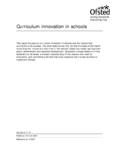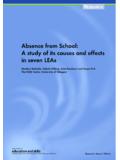Transcription of .0#*-& %&7*$&4 */ &3-: -&3/*/( - A College of Queen's ...
1 MOBILE DEVICES IN EARLY LEARNINGEVALUATING THEUSE OF PORTABLEDEVICES TO SUPPORT YOUNG CHILDREN'S LEARNING DR COLETTE GRAY, DR JILL DUNN, DR PAMELA MOFFETT & DR DENISE MITCHELL RESEARCH REPORT REPORT COMMISSIONED BY MAY 2017 2 Executive summary Digital technology has become an everyday part of young people s lives both at home and in the classroom. Portable tablet devices in particular have become increasingly popular with more and more children having access to or ownership of iPads and other digital devices. Recognising the educational potential of this technology, many schools have prioritised the integration of tablet devices into their classrooms.
2 Indeed, these machines offer a number of potential advantages compared to desktop computers, including portability, intuitive design, and a touchscreen interface. However, the increasing presence of digital technology in homes and schools raises important questions about its role in children s learning and development. The pilot project Developing the use of portable devices in early years learning investigated the long-term implementation of iPads in five Northern Ireland primary schools located within the Belfast Education and Library Board1 (BELB) area, and associated feeder nursery/pre-schools.
3 This study aimed to evaluate the outcomes of the pilot project. The primary objective of the study was to assess the impact of the use of iPads on children s learning in the Early Years and Foundation Stage of education. It focused on the impact upon literacy and numeracy, as well as examining the extent to which 2iPads can support other areas of the curriculum. 1 On 01 April 2015, the Education Authority became operational and took over all of the roles and responsibilities of the former Education and Library Boards (ELBs) and the Staff Commission.
4 2 Whilst this report examines the implementation and use of iPads, generic terms such as tablet devices and 'handheld, digital or portable devices are variously employed to reflect the properties of a device or the range and variety of devices available to children at home. Language & LiteracyMathematics & NumeracyThe ArtsThe World Around UsPersonal Development & Mutual UnderstandingReligious Education 3 The investigation also focused on secondary objectives including the impact on teaching and pedagogy, leadership and management, and parental involvement.
5 The research was undertaken in four phases using a mixed-methods approach and it involved school principals, classroom teachers, ICT coordinators, pupils and parents. A detailed account of the methods utilized to interrogate the data is included in Chapter 3. Key findings are summarised below with more detailed findings reported in the final section of each chapter. Key findings Impact on literacy and numeracy For the most part, principals and teachers in the participating schools believe that the introduction of digital technology has had a positive impact on the development of children s literacy and numeracy skills.
6 Contrary to initial expectations, principals and teachers report that the use of iPads in the classroom has enhanced children s communication skills. In many lessons, particularly where pupils were sharing iPads, there was a high level of discussion. The use of iPads has had a positive impact on reading and writing, particularly with the creation of children s own digital books. The iPad has the potential to enhance children s numeracy skills in a more engaging and exciting way than traditional approaches. Teaching & Pedagogy Leadership & Management Parental Involvement 4 Digital technology complements existing teaching approaches in numeracy rather than replaces them.
7 Open-ended apps encourage pupil choice within a range of literacy and numeracy based activities. Children s fine motor skills are reinforced when they use a stylus to practise letter formation on screen. Principals and teachers agree that digital devices have the potential to complement all areas of the curriculum and that schools are yet to realise the full potential of these devices. The iPad supports the development of other skills such as recording, taking photographs, web searches, cropping and drag and drop. It is believed that digital devices have increased children s confidence and ownership of the learning process.
8 Children view learning using handheld devices as play and are more highly motivated, enthused and engaged when tasks are presented on tablet devices. There is potential for iPads to support the learning needs of children who require additional support. There is evidence of a range of levels of competency and creativity in the use of digital technology by teachers and pupils both across schools and within schools. Boys appear to be more enthused when using digital technology, particularly when producing pieces of written work.
9 Impact on teachers professional development and learning Principals and teachers believe that the introduction of iPads has had a positive impact on teachers motivation and enthusiasm. Although teachers were initially nervous about using digital technology, there was evidence to suggest that teachers had developed their confidence and competence throughout the project. Teachers are continuing to review their practice in order to identify how, and where, they can include the use of digital technology to support their teaching. 5 Recording and monitoring children s progress directly onto a tablet device had proved beneficial, particularly with regard to teacher workload.
10 The iPad also has the potential to offer rich resource material for the Irish Medium sector. Impact on leadership and management In all of the schools, iPads are used at the discretion of the class teacher and this often involves collaborative use. The majority of children expressed a preference for collaborative use, claiming that it was more fun or that it was kind to share. Children showed great awareness of the care required when using portable devices. Most principals hope to extend and develop the use of digital technology throughout the school.







